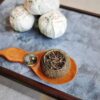
From soothing sips to natural remedies, black tea has long been celebrated for its healing properties when it comes to cough relief. Whether you’re battling a persistent cough or simply looking for a comforting beverage to ease your throat, black tea can be a powerful ally in your quest for relief.
Rich in antioxidants and natural compounds, black tea possesses anti-inflammatory properties that can help soothe irritated airways and reduce the intensity of coughing fits. Moreover, its warm and invigorating qualities provide a soothing sensation that can offer instant relief to irritated throats.
Steeped black tea can also be combined with other natural ingredients like honey, ginger, and lemon to create a potent cough remedy. These additions not only enhance the flavor of the tea but also contribute their own healing benefits, such as honey’s soothing effect on sore throats and ginger’s antimicrobial properties.
Whether you prefer a simple cup of black tea or a more complex concoction, incorporating this ancient remedy into your cough relief regimen can provide both comfort and healing. So, say goodbye to troublesome coughs and indulge in the healing power of black tea today.
Understanding the Common Cold and Cough
To fully appreciate the healing power of black tea for cough relief, it’s essential to understand the common cold and cough, which often go hand in hand. The common cold is a viral infection that primarily affects the upper respiratory system, resulting in symptoms such as a runny or stuffy nose, sneezing, sore throat, and coughing.
Coughing is the body’s natural response to clear the airways of irritants, mucus, or foreign substances. While a cough is usually a temporary annoyance, it can become persistent and disruptive, leading to discomfort and sleep disturbances. Finding effective remedies to alleviate cough symptoms is crucial for overall well-being and quality of life.
How Black Tea Helps in Relieving Cough Symptoms
Black tea contains various bioactive compounds that contribute to its healing properties. The most notable compounds include polyphenols, such as catechins and flavonoids, which act as powerful antioxidants. These antioxidants help protect the body’s cells from damage caused by free radicals, reducing inflammation and promoting overall health.
The tannins found in black tea also provide astringent properties, which can help soothe irritated throat tissues and alleviate cough symptoms. Additionally, black tea contains caffeine, which acts as a natural bronchodilator, helping to open up airways and improve breathing.
When consumed hot, black tea’s steam and warmth can help to loosen mucus and phlegm, making it easier to expel and providing relief from chest congestion. Its soothing qualities can also help reduce the frequency and severity of coughing fits, allowing for a more comfortable recovery.
The Active Compounds in Black Tea That Contribute to Cough Relief
Black tea owes its healing properties to a variety of active compounds found within its leaves. One of the key compounds is theaflavin, which possesses antioxidant and anti-inflammatory properties. Theaflavins have been shown to inhibit the release of histamine, a compound involved in allergic reactions and inflammation, thereby reducing cough symptoms.
Epigallocatechin gallate (EGCG) is another powerful compound found in black tea. EGCG has been extensively studied for its antiviral and antimicrobial properties, making it an effective agent against respiratory infections that often cause coughing. By targeting the underlying causes of coughs, EGCG helps to alleviate symptoms and promote recovery.
The caffeine content in black tea acts as a bronchodilator, relaxing the smooth muscles in the airways and improving airflow. This can be particularly beneficial in cases of coughing caused by bronchial constriction or asthma. The combination of these active compounds makes black tea a natural and effective remedy for cough relief.
Different Types of Black Tea for Cough Relief
Black tea comes in various forms and flavors, each with its own unique characteristics and potential benefits for cough relief. Here are some popular options:
1. Earl Grey
Earl Grey is a classic black tea infused with the essence of bergamot, a citrus fruit known for its aromatic and therapeutic properties. The uplifting aroma and distinctive flavor of Earl Grey make it a popular choice for soothing coughs, while the bergamot oil provides additional antibacterial benefits.
2. English Breakfast
English Breakfast tea is a robust blend of black teas, typically Assam, Ceylon, and Kenyan varieties. Its full-bodied flavor and rich aroma make it a comforting choice for cough relief. English Breakfast tea is often enjoyed with milk and honey, which can further enhance its soothing effects.
3. Darjeeling
Darjeeling tea is a prized black tea from the Darjeeling region of India, known for its delicate flavor and floral undertones. It offers a milder alternative for those who prefer a lighter taste while still benefiting from the healing properties of black tea. Darjeeling tea can be enjoyed plain or with a touch of honey for added sweetness.
4. Chai
Chai tea is a spiced black tea originating from India, typically made with a blend of black tea leaves, aromatic spices, and milk. The combination of warming spices like cinnamon, ginger, and cloves provides additional therapeutic benefits for cough relief. Chai tea can be enjoyed with or without milk, depending on personal preference.
Brewing and Preparing Black Tea for Maximum Effectiveness
To make the most of black tea’s healing properties for cough relief, proper brewing and preparation techniques are essential. Follow these steps for optimal effectiveness:
1. Choose high-quality black tea leaves:
Select loose-leaf black tea or high-quality tea bags to ensure the best flavor and potency. Look for teas that are organic and free from artificial additives or flavorings.
2. Measure the right amount of tea:
Use approximately one teaspoon of loose-leaf tea or one tea bag per cup of water. Adjust the amount based on personal preference for a stronger or milder brew.
3. Heat the water to the correct temperature:
Black tea is best brewed with water that has been brought to a rolling boil, around 212°F (100°C). Avoid using boiling water directly on the tea leaves, as it can result in a bitter taste.
4. Steep the tea for the appropriate time:
For black tea, steeping times typically range from 3 to 5 minutes. Longer steeping times may result in a stronger flavor but can also lead to increased bitterness.
5. Add natural ingredients for enhanced benefits:
Consider adding a teaspoon of honey, a slice of fresh ginger, or a squeeze of lemon to your black tea for added flavor and additional healing properties.
6. Strain or remove the tea bag:
Once the desired steeping time has elapsed, strain the tea leaves or remove the tea bag from the cup to prevent over-extraction and bitterness.
By following these brewing and preparation guidelines, you can maximize the effectiveness of black tea as a remedy for cough relief.
Other Natural Remedies That Can Be Combined With Black Tea
Black tea can be further enhanced by combining it with other natural ingredients known for their healing properties. Here are some popular additions to consider:
1. Honey
Honey is a well-known natural remedy for soothing sore throats and suppressing coughs. It has antimicrobial properties that help fight infection and reduce inflammation. Adding a teaspoon of honey to your black tea not only enhances the flavor but also provides additional relief for cough symptoms.
2. Ginger
Ginger is a potent natural ingredient with antimicrobial, anti-inflammatory, and immune-boosting properties. Its warming effect can help soothe irritated throats and reduce coughing. Adding a few slices of fresh ginger to your black tea will not only enhance the taste but also contribute to its healing benefits.
3. Lemon
Lemon is rich in vitamin C and has antibacterial properties that can help fight respiratory infections. Squeezing a fresh lemon into your black tea adds a refreshing tang and boosts its immune-boosting properties. Lemon also helps cut through any mucus or phlegm, providing further relief from cough symptoms.
Combining black tea with honey, ginger, or lemon creates a potent cough remedy that is not only effective but also delicious and soothing.
Incorporating Black Tea Into Your Daily Routine
To make the most of black tea’s healing power for cough relief, consider the following tips for incorporating it into your daily routine:
1. Start your day with a cup of black tea:
Replace your usual morning beverage with a cup of black tea to kickstart your day with a soothing and healing ritual. Choose a flavor that appeals to you and experiment with different natural additions to find your preferred combination.
2. Enjoy black tea as a midday pick-me-up:
When experiencing cough symptoms throughout the day, a cup of black tea can provide instant relief and comfort. Keep a thermos or a travel mug filled with steeped black tea handy for on-the-go relief whenever needed.
3. Wind down with black tea before bed:
Sip on a warm cup of black tea before bedtime to relax your body and soothe your throat, promoting a restful night’s sleep. Opt for decaffeinated black tea if you are sensitive to caffeine to ensure a peaceful slumber.
4. Experiment with flavors and additions:
Black tea offers a wide range of flavors and combinations, so don’t be afraid to get creative. Try different types of black tea, such as Earl Grey or Chai, and experiment with natural additions like cinnamon, cloves, or even a splash of almond milk for added flavor and variety.
5. Stay hydrated throughout the day:
In addition to enjoying black tea, it’s crucial to stay hydrated by drinking plenty of water. Hydration helps keep your throat moist and can alleviate cough symptoms. Alternate between black tea and water throughout the day to stay hydrated and maximize the benefits of both.
Incorporating black tea into your daily routine for cough relief not only provides physical benefits but also creates a comforting and mindful ritual that can contribute to overall well-being.
Precautions and Potential Side Effects
While black tea is generally safe for consumption, it’s essential to be aware of potential precautions and side effects. Consider the following:
1. Caffeine sensitivity:
Black tea contains caffeine, which can cause symptoms such as restlessness, increased heart rate, or difficulty sleeping in some individuals. If you are sensitive to caffeine or have trouble sleeping, opt for decaffeinated black tea or consume it earlier in the day.
2. Allergies:
If you have known allergies to any ingredients commonly found in black tea, such as tea leaves, bergamot, or spices, it’s best to avoid consuming black tea or choose a variety that does not include those specific ingredients.
3. Interactions with medications:
Some medications, such as certain antibiotics or blood thinners, may interact with black tea. If you are taking any medications, consult with your healthcare provider before incorporating black tea into your cough relief regimen.
4. Steeping time and temperature:
Oversteeping black tea or using water that is too hot can result in a bitter taste. Follow the recommended brewing guidelines mentioned earlier to avoid any unpleasant flavors or potential side effects.
It’s always a good idea to listen to your body and adjust your consumption of black tea based on your individual needs and tolerance. If you experience any adverse reactions or concerns, consult with a healthcare professional.
Black Tea for a Soothing Cough Relief Experience
Black tea has been trusted for centuries as a natural remedy for cough relief. Its rich antioxidants, anti-inflammatory properties, and soothing qualities make it an effective and comforting option for alleviating cough symptoms.
By understanding the common cold and cough, exploring the active compounds in black tea that contribute to cough relief, and incorporating natural additions like honey, ginger, and lemon, you can create a powerful cough remedy that not only soothes your throat but also supports your overall well-being.
Remember to choose high-quality black tea, follow proper brewing techniques, and consider any precautions or potential side effects. By embracing the healing power of black tea, you can bid farewell to troublesome coughs and embrace the soothing comfort it brings. So, sit back, sip on a warm cup of black tea, and let its natural remedies work their magic. sip on a warm cup of black tea, and let its natural remedies work their magic.






